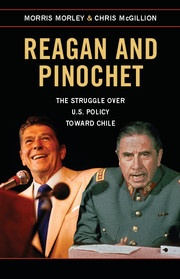Conclusion
Published online by Cambridge University Press: 05 February 2015
Summary
Ronald Reagan entered the White House determined to jettison what he perceived as Jimmy Carter’s hostile human rights policy toward autocratic regimes in Latin America and revert to a more traditional Cold War approach based on stability, security, and quiet diplomacy. The government of General Augusto Pinochet in Chile was greeted as an ideological (anticommunist) ally presiding over a model free market economy with little beyond lip service paid to its violent method of rule. Pinochet himself was showered with praise for having saved Chile from the chaos of the Allende years, and the military junta was offered all possible support to consolidate and maintain its hold on political power to counter any residual Marxist-terrorist threat.
During the latter half of Reagan’s first term, however, a policy of cohabiting with “acceptable” dictators was becoming increasingly less viable, as public and congressional support for foreign alliances justified in the name of anticommunism had ebbed considerably and as military regimes across Latin America were revealed as unable to contain popular discontent because of their repressive political rule and/or their incompetence as economic managers. For Washington policy makers, this trend posed the problem of how to influence transitions from dictatorship to democracy in a way that conserved the institutional power and integrity of the armed forces and preserved U.S. strategic, political, and economic interests during and after a transition from military rule. Under Reagan, this translated into efforts to co-opt and shape political transitions in a manner that minimized losses and provided the best possible outcomes from the point of view of U.S. interests. What mattered was which sectors of the opposition movement would inherit power and thus oversee the direction of change: antisystem forces that conjured up images of major shifts in the distribution of political and class power, the restructuring of a capitalist economy, and the transformation of the state; or antiregime forces willing to accommodate and coexist with existing authoritarian/military state structures and compatible with U.S. interests.
- Type
- Chapter
- Information
- Reagan and PinochetThe Struggle over US Policy toward Chile, pp. 312 - 324Publisher: Cambridge University PressPrint publication year: 2015

